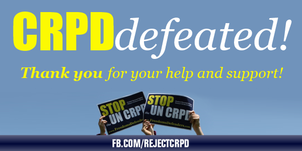Wrong for the disabled. Wrong for America.
Who should make critical decisions regarding the care and raising of children with disabilities? Their parents or UN social workers?
The United Nations Convention on the Rights of Persons with Disabilities (CRPD) attempts to answer that question. One minor problem, though. The UN contended that the government should have the authority! Read a summary of the facts about the CRPD and learn how to take action below.
UPDATE FROM DR. MICHAEL FARRIS: "Ted Cruz and I at the national pro family legislators conference. He told me that he doesn't hear any talk about Harry Reid trying to ratify the UN CRPD treaty during the lame duck session."
See Dr. Farris' Facebook post here.
The United Nations Convention on the Rights of Persons with Disabilities (CRPD) attempts to answer that question. One minor problem, though. The UN contended that the government should have the authority! Read a summary of the facts about the CRPD and learn how to take action below.
UPDATE FROM DR. MICHAEL FARRIS: "Ted Cruz and I at the national pro family legislators conference. He told me that he doesn't hear any talk about Harry Reid trying to ratify the UN CRPD treaty during the lame duck session."
See Dr. Farris' Facebook post here.
MYTHS ABOUT CRPD
MYTH: US ratification of the CRPD will help disabled Americans traveling and living abroad and give us a seat at the table so that we can provide guidance to the international community in regards to accessibility and treatment of those with disabilities.
FACT: US ratification of this treaty has no impact on other nations. Even nations that have already ratified the CRPD are not complying with its terms, and they will not suddenly decide to do so if the United States ratifies the treaty. MYTH: Ratification of the treaty has no impact on US laws. FACT: International treaties override federal laws, state constitutions, and state laws. In international courts, they also overrule a nation's constitution. MYTH: Ratification of CRPD will help the disabled in the United States. FACT: Even treaty proponents admit that existing American law (Americans with Disabilities Act) already meets or exceeds the standards set forth in the CRPD. There is no reason to trade our "gold standard" in laws protecting those with disabilities for a United Nations treaty that surrenders parental rights and national sovereignty to unelected international bureaucrats. |
WHY WE OPPOSE CRPD
National Sovereignty: Under the Constitution, international treaties ratified by the United States become the law of the land - overruling the US Constitution, federal laws, state constitutions, and state laws. The CRPD also gives the United Nations power to ensure that the United States is complying with the treaty.
Parental Rights: This treaty, if ratified by the U.S. Senate, would turn the parent-child relationship on its head by establishing a dangerous new legal standard for dealing with children with disabilities: the best interests of the child standard. In Article 7(2), the CRPD states: “In all actions concerning children with disabilities, the best interests of the child shall be a primary consideration.” What this essentially means is that the government and the UN determine what is best for a child, not their parents. Putting a government bureaucrat into all parent-child relationships will never prove to be beneficial for society. Abortion: Article 23 says that those with disabilities have a right to make reproductive health and family planning decisions, a right to be educated about those decisions, and given the means to carry out those decisions. This would include government-funded Planned Parenthood-style education as well as full funding of all medical services needed for such matters. |
EMAIL YOUR SENATORS
COMING SOON
|


